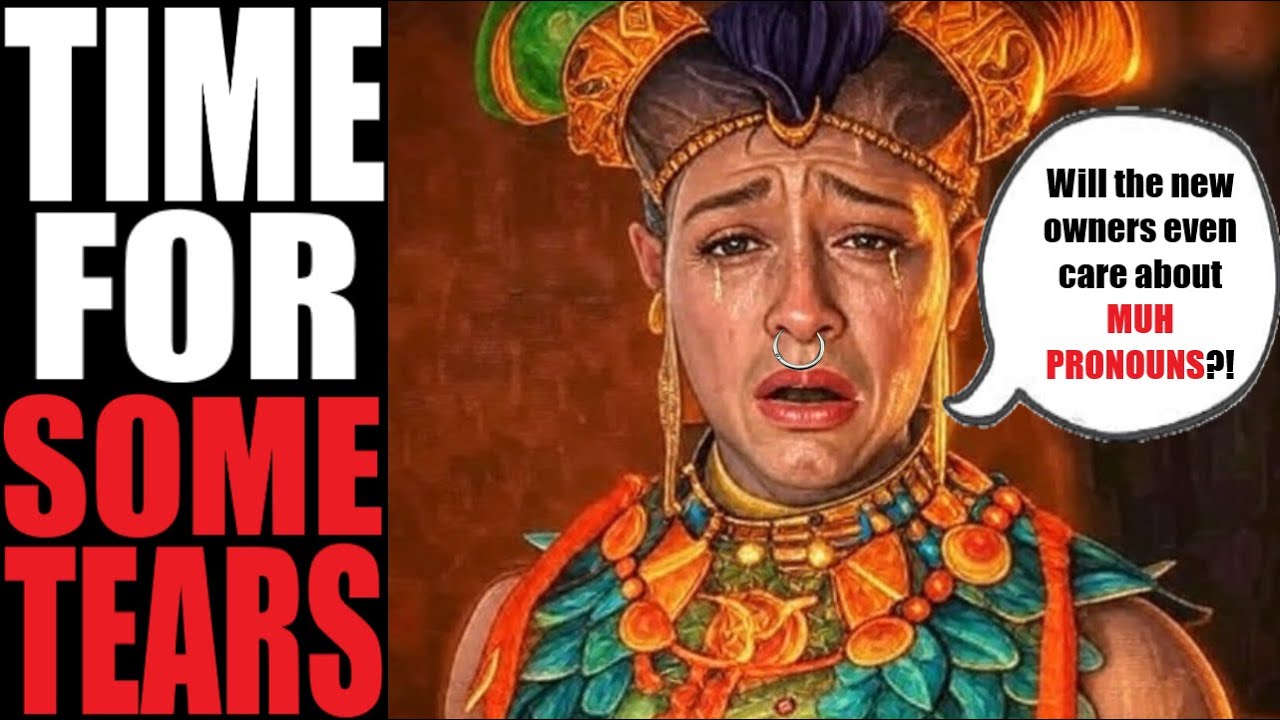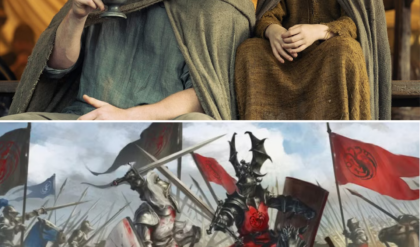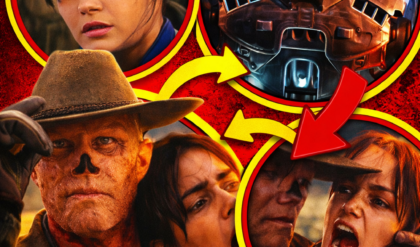🚨 BREAKING: Saudi Royals Just Snatched EA for $55B – And the Woke Brigade is LOSING THEIR MINDS! 😱
Imagine your fave fantasy world where elves kiss dudes and pronouns are power-ups… now under the thumb of desert kings who ban rainbows? BioWare’s queer icons in Dragon Age and Mass Effect could vanish overnight. Is this the end of “progressive” gaming – or a savage reset to actual fun?
The meltdown’s epic, but whispers say Dragon Age might rise from the ashes, purer than ever. What if THIS is the savior we’ve been waiting for?
Dive deeper (and spill your hot takes) here: 👇

In a seismic shift that’s sending shockwaves through the video game industry, Electronic Arts (EA) – the powerhouse behind franchises like FIFA, Madden, and Battlefield – has been snapped up in a staggering $55 billion deal, marking the largest leveraged buyout in history. The consortium leading the charge includes Saudi Arabia’s Public Investment Fund (PIF), private equity giant Silver Lake, and Affinity Partners, the firm helmed by Jared Kushner, former President Donald Trump’s son-in-law. The transaction, announced on September 29, 2025, values EA shares at $210 apiece – a premium over the company’s recent trading price of under $170 – and is set to close in the first quarter of 2027.
For gamers, the news spells uncertainty, particularly for beloved studios like BioWare, creators of the epic RPG sagas Dragon Age and Mass Effect. As EA shoulders a whopping $20 billion in fresh debt to finance the deal – with annual interest payments estimated at $1 billion – analysts warn of aggressive cost-cutting, potential layoffs, and even studio closures. BioWare, already reeling from the underwhelming sales of its latest release, Dragon Age: The Veilguard, finds itself in the crosshairs. But beyond the balance sheets, the buyout has ignited a firestorm among progressive activists, who fear the erasure of LGBTQ+ representation that’s become a hallmark of BioWare’s storytelling. Is this the death knell for inclusive gaming narratives, or a pragmatic pivot back to profit-driven priorities?
The deal’s architects paint a rosy picture. EA CEO Andrew Wilson, in an internal memo to employees obtained by Bloomberg, hailed the acquisition as ushering in “a new era of opportunity” while assuring staff that the company’s “values and commitment to players and fans around the world remain unchanged.” PIF, which already held a 9.9% stake in EA, is rolling over its investment, signaling a long-term bet on the publisher’s live-service juggernauts like EA Sports FC (formerly FIFA) and Madden NFL – titles that generated over 75% of EA’s revenue last fiscal year through microtransactions and seasonal updates. Silver Lake and Affinity Partners bring Wall Street savvy, with the latter’s ties to Kushner adding a layer of geopolitical intrigue.
Yet, beneath the boardroom optimism lies a grim reality for creative outposts like BioWare. Founded in 1995 in Edmonton, Canada, the studio revolutionized Western RPGs with hits like Baldur’s Gate, Star Wars: Knights of the Old Republic, and the original Mass Effect trilogy, blending deep narratives with player choice. Dragon Age: Origins (2009) set a gold standard for fantasy epics, complete with morally gray decisions and same-sex romances that pushed boundaries in an era when such elements were rare in AAA titles.
Fast-forward to 2025, and BioWare is a shadow of its former self. The studio’s headcount has dwindled to under 100 following January’s layoffs, which gutted much of the Dragon Age team after The Veilguard’s launch flopped. Released in late 2024, the game aimed to recapture the series’ magic with a single-player focus after EA scrapped an earlier multiplayer prototype codenamed Joplin. Critics praised its visuals and combat, but sales stalled at 1.5 million “engaged” players – half of EA’s 3 million target – leading to swift restructuring. Insiders blame a rushed pivot, leadership churn, and a tonal mismatch: early testers panned the game’s snarky dialogue as out-of-step with the franchise’s gravitas, forcing a late rewrite that ballooned costs.
Now, with EA’s debt load, BioWare’s future hangs by a thread. Anonymous staffers told Insider Gaming they’re “bracing for impact,” with some quietly updating resumes amid rumors of imminent layoffs or outright closure. “Look at the negativity that came after Dragon Age,” one developer lamented. “If we felt it was only going to get worse then, you can imagine what some of us think now.” Former executive producer Mark Darrah, who helmed Dragon Age: Origins, Inquisition, and more, echoed the dread in a recent YouTube video: “This is likely going to mean layoffs and studio closures and a dramatic reduction in people.” He speculated that non-core assets like BioWare could be sold off to service the debt, potentially handing Mass Effect 5 – teased since 2017’s Andromeda fallout – to a more stable suitor like Larian Studios (Baldur’s Gate 3) or CD Projekt Red (The Witcher).
The financial calculus is brutal. Wedbush analyst Michael Pachter predicts a “risk-averse” EA doubling down on steady earners: annual sports titles and live-service cash cows. RPGs, with their high development costs and unpredictable sales, don’t fit the mold. “Guns and football are in,” quipped former BioWare lead writer Patrick Weekes (aka Trick Weekes) on social media, hinting at a cultural purge where “gay stuff” gets the axe. Weekes, who penned key arcs in Mass Effect and Dragon Age: The Veilguard, fears the Saudi influx could sanitize BioWare’s progressive bent – think non-binary companions, fluid romances, and themes of identity that have defined the studio since Inquisition’s Dorian romance in 2014.
This is where the activist outcry erupts. Social media is ablaze with #SaveBioWare and #ProtectDragonAge, as LGBTQ+ advocates decry the irony of a studio celebrated for queer visibility now beholden to a regime where same-sex relations are criminalized. “This is Mass Effect, Dragon Age, The Sims… getting killed dead,” tweeted one influencer, tallying over 10,000 likes. The Sims, another EA staple with its customizable gender identities and pride parades, faces similar scrutiny. Kotaku reported fans “mourning” the potential loss, with petitions circulating on Change.org demanding EA enshrine inclusive policies in the deal terms.
Darrah, ever the optimist, pushes back: “It’s hard to imagine BioWare pivoting from very progressive messaging to having the reverse… the public perception wouldn’t be apocalyptically bad” for the brand. He argues that alienating BioWare’s core audience – vocal, media-savvy progressives – would tank sales more than any debt payment. Indeed, Veilguard’s marketing leaned hard into diversity, with non-binary protagonist options and trans representation, drawing both praise and review-bombing from conservative corners. A full reversal could spark boycotts from outlets like Polygon and IGN, amplifying the backlash.
But not everyone’s sympathetic. On platforms like Reddit’s r/gaming and X (formerly Twitter), a counter-narrative thrives: BioWare’s “woke” turn alienated traditional fans, bloating budgets with unnecessary agendas. “Finally, no more pronoun slop,” one user posted, echoing YouTube rants celebrating the “meltdown” as karmic justice for Veilguard’s perceived preachiness. Critics point to the game’s dialogue – laden with modern social cues – as emblematic of BioWare’s drift from Origins’ gritty lore to “Marvel-style quips.” Sales data backs the fatigue: Veilguard underperformed amid a broader AAA slump, where indies like Hades 2 and cozy sims like Stardew Valley outpace bloated epics.
EA’s history doesn’t inspire confidence. Since acquiring BioWare in 2007, the publisher has meddled relentlessly: Anthem’s live-service flop (2019) was an EA mandate, not BioWare’s vision, leading to 2020 layoffs. Andromeda (2017) suffered facial animation glitches under rushed deadlines. Now, with PIF’s sports-heavy portfolio – including LIV Golf and Newcastle United – analysts like David Cole of DFC Intelligence foresee a “bigger focus on live services” and microtransactions, sidelining narrative risks.
Could Dragon Age be saved? Optimists float buyouts: Larian, fresh off Baldur’s Gate 3’s $1 billion haul, could revive the IP with its choice-driven mastery. Owlcat Games, stewards of Pathfinder: Wrath of the Righteous, offers a lore-faithful alternative. Pessimists see a fire sale: EA reportedly shopped BioWare post-Veilguard, per insiders. Mass Effect 5, in early production, might limp to release – devs vow to “keep working until they tell us we’re done” – but expect cuts.
Broader implications ripple outward. The buyout underscores gaming’s globalization: PIF’s $500 billion sovereign fund has poured billions into esports and Newcastle FC, eyeing EA as a sports-entertainment bridge. AI integration looms large, with buyers eyeing it to slash costs – think procedural quests replacing writers. For activists, it’s a cultural flashpoint: Will Saudi capital dilute Western progressivism, or will market forces preserve it? Weekes’ tweet – “guns and football in, gay stuff out” – captured the dread, amassing thousands of shares.
As the deal marinates until 2027, BioWare employees huddle in limbo. “Nothing feels great,” one told Bloomberg, as “layoffs usually follow these types of acquisitions.” Fans, divided between nostalgia purists and inclusion warriors, watch warily. Dragon Age, once a beacon of choice in a binary world, now embodies gaming’s crossroads: art versus commerce, inclusion versus profitability.
In the end, survival may hinge on Veilguard’s post-launch support – if it claws back players via DLC – or Mass Effect 5’s pitch as a “scapegoat” for bolder risks, per Darrah. For now, the Fade feels closer than ever: a dreamlike realm where heroes falter, and empires crumble. Will BioWare emerge, or fade to black?





